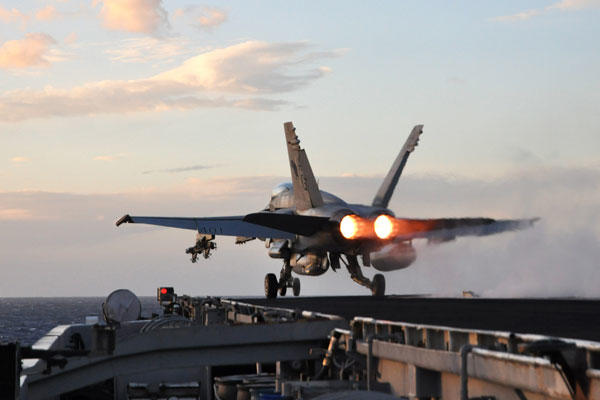The Pentagon on Friday left open the possibility that the air campaign in Iraq could be expanded to hit bases of the Islamic State of Iraq and the Levant (ISIL) in Syria.
"We don't telegraph our punches," said Rear Adm. John Kirby, the Pentagon press secretary. He referred to remarks Thursday by Defense Secretary Chuck Hagel, who said "we're considering all options" to counter ISIL fighters who have surged out of their Syrian bases to take large swaths of Iraqi territory.
Kirby said Hagel "didn't rule anything in or out. I'm not going to speculate on where that might take us."
Kirby added that "you can rest assured that the leadership here in the Pentagon understands the threat posed by this group, understands the threat posed inside Iraq."
At the Thursday Pentagon briefing with Hagel, Army Gen. Martin Dempsey, the chairman of the Joint Chiefs of Staff, was more direct when asked if ISIL could be defeated without going after the Syrian bases.
"To your question, can they be defeated without addressing that part of their organization which resides in Syria? The answer is no," Dempsey said.
In a recent interview with USA Today, Dempsey said the current airstrikes in Iraq were making progress but would not be enough to minimize the ISIL threat.
"We still haven't addressed the issue of ISIS in Syria," Dempsey said, using another acronym for the terror group. "That's an important part of this, and that has yet to be addressed."
Following the beheading of American journalist James Foley by ISIL terrorists, the Obama administration was under increasing pressure from Congress to widen the air campaign from the carrier George H.W. Bush in the Persian Gulf and from land bases in the region.
Sen. John McCain, R-Arizona, told Fox News Thursday that the Obama administration was carrying out a policy of containment rather than one aimed at destroying ISIL.
"We don't have to contain ISIS," McCain said. "We have to defeat ISIS, and we have to do whatever is necessary," he said.
On Friday, U.S. aircraft continued airstrikes in the area around the recently recaptured Mosul dam, the U.S. Central Command said in a statement. The airstrikes destroyed two ISIL armed vehicles and a machinegun position that was firing on Iraqi national security forces, CentCom officials said.
In northeastern Iraq Friday, Kurdish forces, known as the peshmerga, and Iraqi forces reportedly made more gains against ISIL, taking several villages and approaching the ISIL-controlled town of Jalawla.
Pershmerga spokesman Brig. Gen. Halgord Hikmat told CNN that Kurdish and Iraqi forces now have surrounded Jalawla, a town of about 50,000.
At the Pentagon briefing on Friday, Kirby repeated the U.S. stance that a unified government in Baghdad was the key to mounting an effective campaign against ISIL.
"Ultimately, the answer is going to be found in good governance," Kirby said.
That goal suffered another setback Friday with an attack on a Sunni mosque northeast of Baghdad in Diyala province believed to have been carried out by ISIL. The attack killed at least 46 and wounded more than 50, the Associated Press reported.
Immediately after the attack, Sunni lawmakers in Baghdad pulled out of talks on forming a new government with Prime Minister-designate Haider al-Abadi.
-- Richard Sisk can be reached at richard.sisk@monster.com






























